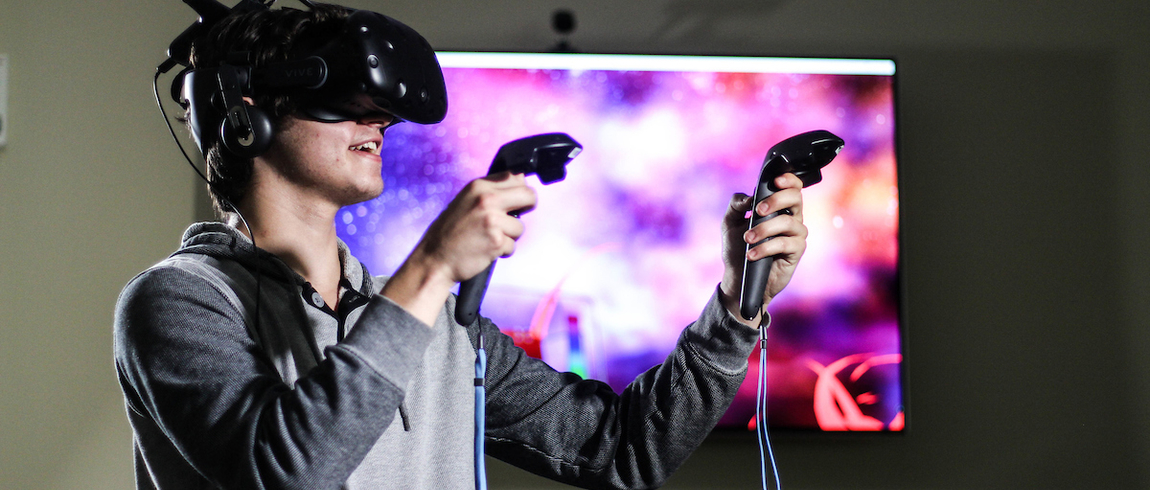Breadcrumb
- Lake Michigan College
- Academics
- Business & Information
- Applications Development
- Virtual reality labs at LMC's Benton Harbor, Niles campuses creating new possibilities for learning
When Kyle Kelly learned that Lake Michigan College purchased some virtual reality equipment, he wanted to carve out space where students and fellow faculty members could explore how to use the technology.
"I asked if the equipment could be in my lab. Once I had the units set up and working, I began reaching out to students and faculty," said Kelly, a faculty member in LMC's Computer Information Systems department. "Before long, I had instructors asking to bring in their entire classes and student clubs asking to hold their meetings and events in my classroom."
Since first purchasing VR equipment about a year ago, Lake Michigan College now has virtual reality labs set up at both Benton Harbor and Niles campuses. Kelly's lab, located on the first floor of the Todd Center, has three HTV Vive Virtual Reality Systems, the large, black goggles with hand-held controllers connected to a computer that use simulated images and surround sound to create an immersive experience. There are two more at the Niles campus. LMC also has added wireless adapters, an upgraded audio head strap, as well as Windows Mixed Reality headsets, which are more mobile and can be used for classroom demos or road presentations.
"The HTC Vive units are powered by computers built for that specific purpose with high-end hardware," Kelly says. "Whatever a user experiences in VR is mirrored to another display in the room so others can spectate."
Spencer Brown, 21-year-old Applications Development major from Stevensville, Mich., found out about LMC VR lab as a member of the gaming club.
"I had always had a fascination with virtual reality since I first heard about, so I went to check it out," Brown said. "Since then, I've been working with Kyle Kelly on seeing just what we can do with VR and expanding virtual reality here at LMC."
Although primarily associated with video gaming platforms, some colleges and universities are beginning to use VR to enhance the educational experience of their students.
"What many people don't realize is that VR is just as useful for industry, training, and education," Kelly said. "Nursing and medical students can interact with hundreds of virtual models and anatomy simulations. Teams can work through problem-solving training and communication exercises. Students can travel to places in VR, which would be too dangerous or costly in real life, such as foreign countries, recreations of historical events, or hazardous work environments."
"There's a program we have for nursing with different guides where you can see different systems of the body," Brown said. "You can isolate different areas such as all the bones and muscles in the head or the skeletal structure. I've seen car engine simulators that show different parts and how one might go about replacing those parts."
Virtual reality has been used in several LMC literature courses, allowing students to become fully immersed in texts, instead of merely reading them from the page.
LMC is also integrating VR in subjects like health sciences, and this fall LMC will offer VR to teach cultural understanding in foreign language classes.
"Virtual reality enhances learning by allowing students to use more of their senses and become fully immersed in experiences like virtual field trips using Google Earth," said LMC's Nicholas Brittin, who teaches language and communications. "It helps bring traditional textbook learning and lectures to life."
As a student, Brown sees virtual reality helping his peers get a better understanding of complex subjects.
"Students learn in different ways. Some do better at seeing; some do better at hearing; some do better with a more hands-on approach," Brown said. "I think VR helps students who are more visual or hands-on understand subjects that are very extensive such as the human systems. Being able to see in three dimensions on something they would only see on a piece of paper otherwise is helpful."
History, art, design, and architecture are just some of the other disciplines where VR can augment traditional lectures. While many larger universities have been opening VR labs on campuses, particularly for medical and nursing programs, Kelly said VR labs are not something many community colleges offer.
"We are fortunate to be on the cutting edge of adopting and supporting this technology," he said. "As word has spread, faculty use has grown exponentially. I would not be surprised if class usage rates doubled or even tripled this coming year."
